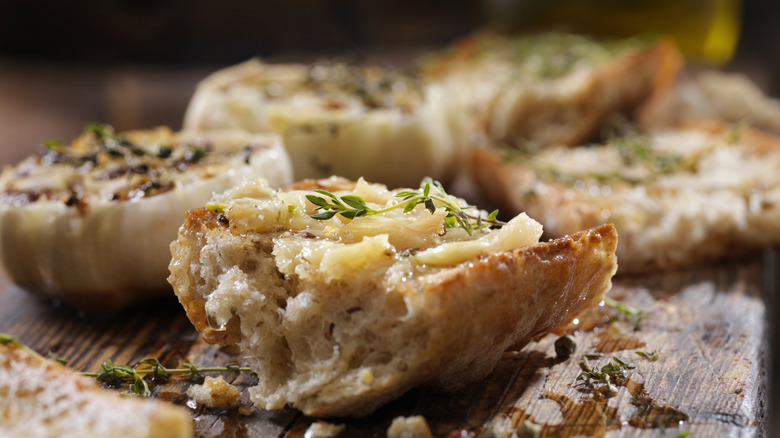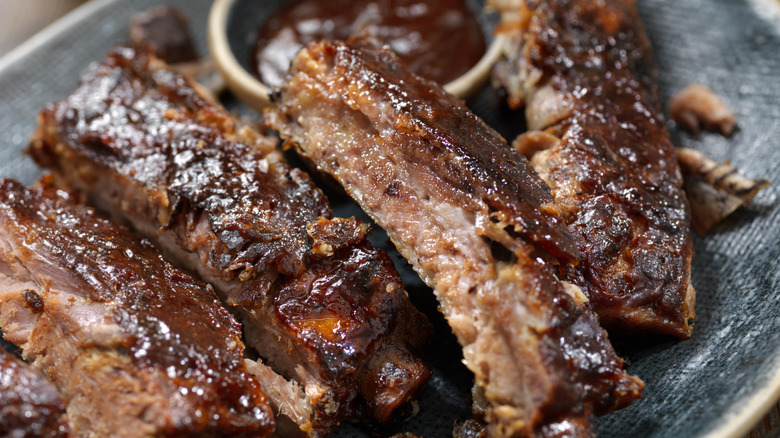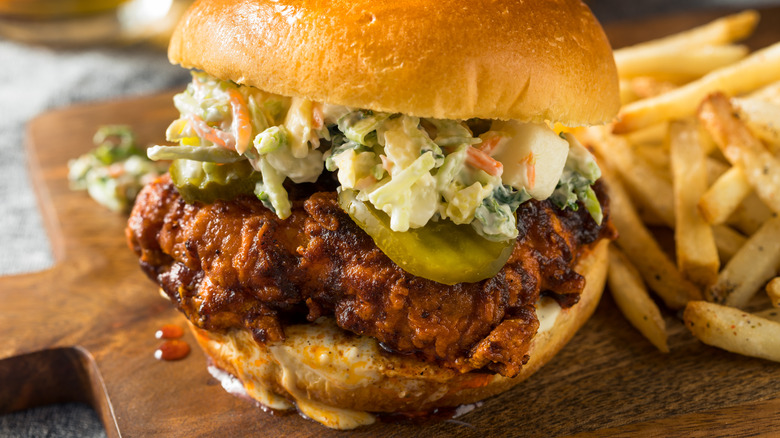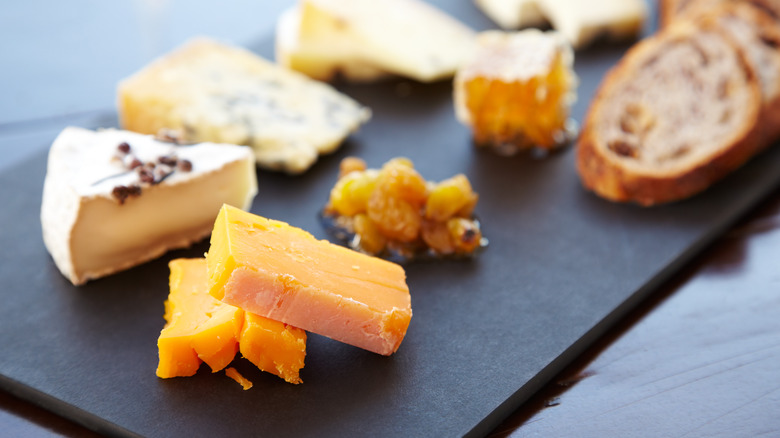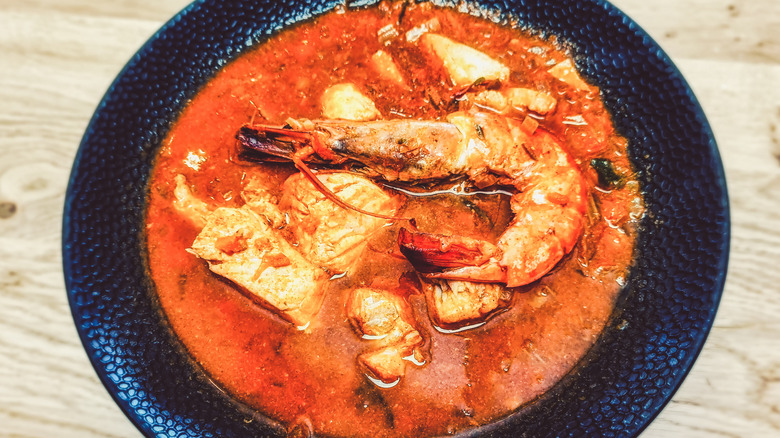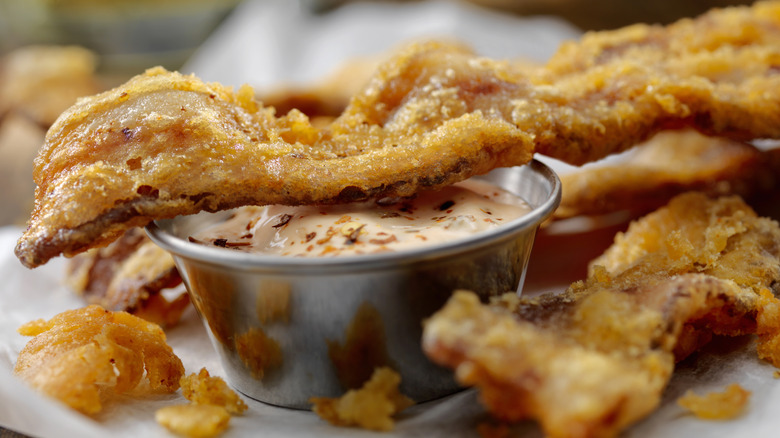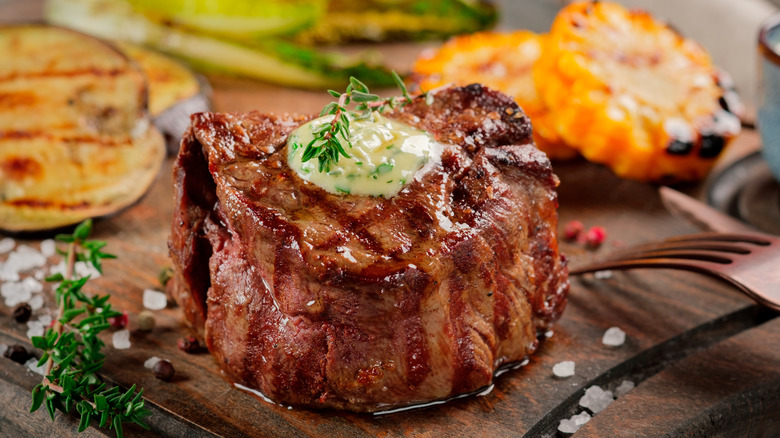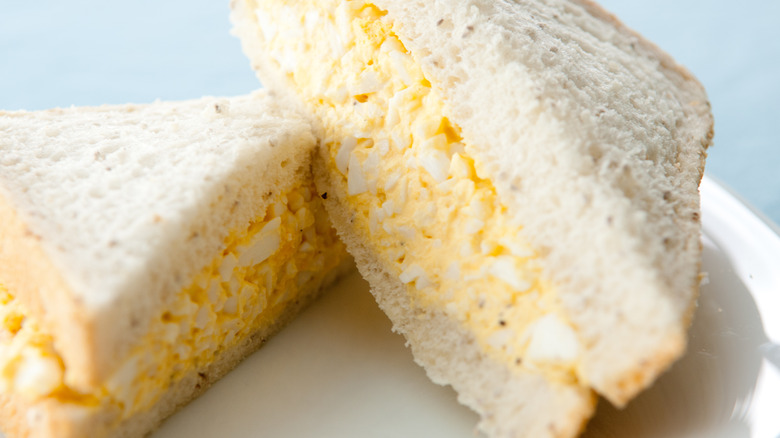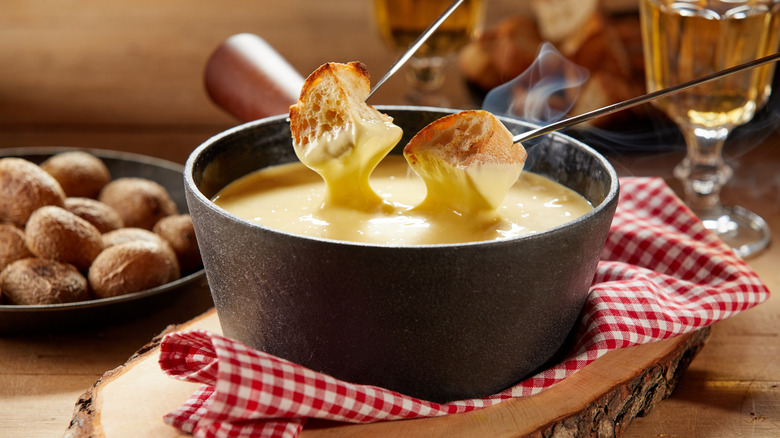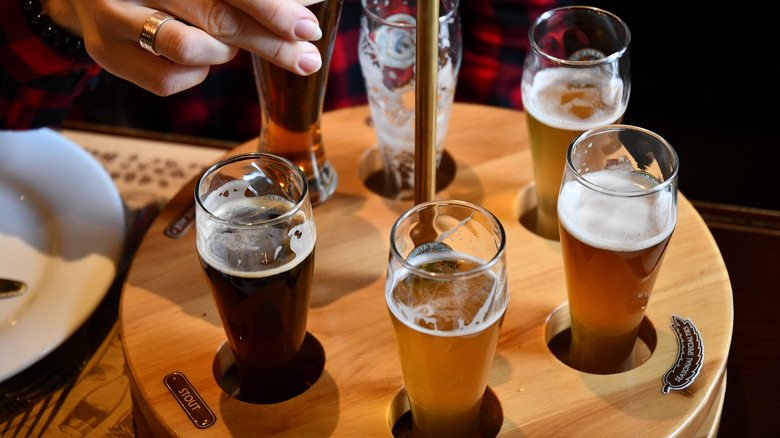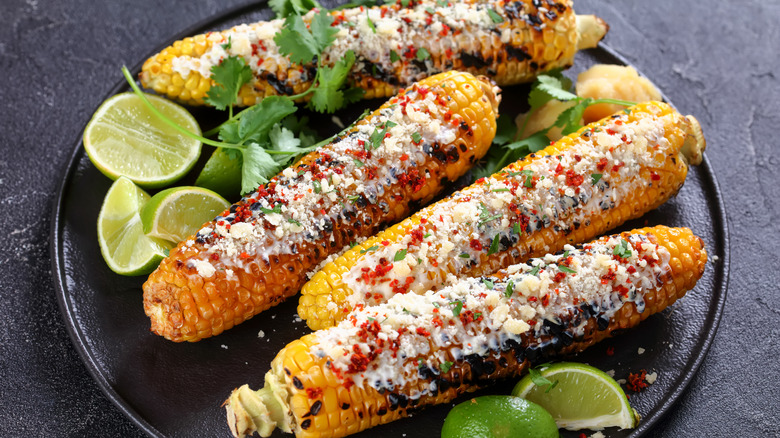The 12 Worst Foods To Order At A Business Dinner
When it comes to a business dinner with co-workers, nobody wants to be that person. You know the one. The new employee who makes a terrible first impression with the visiting client. Or the manager who ends up being the butt of jokes back at the office for weeks to come over some mealtime faux pas.
Sure, when you're meeting for drinks or a quick happy hour with the gang from work, things can be easy breezy — and nobody is likely to judge you too much. But when you're having an important business dinner, things are completely different. You may be entertaining out-of-town guests. Your boss may be there. Or maybe the boss of your boss. You likely need to get at least some level of work done during the course of your meal. It can be a high pressure situation where every choice matters — especially what you choose to eat.
Pick the wrong thing and you risk not only embarrassing yourself but also possibly impacting your career in some way. Sure, you may not get fired because you ordered the platter of loaded nachos or a giant French onion soup, but you risk making a terrible first impression. Or you might just end up looking foolish, amateurish, or just out of touch with the image you want to project.
No matter where work takes you at meal time, make sure you banish the below foods from your business dinner repertoire.
Steer clear of garlic-packed dishes
The garlic shrimp scampi might sound amazing. Perhaps you really love garlic bread. Or you just can't resist Aglio e Olio pasta. But no matter how much you like to eat garlic-drenched foods, never, ever order them during a business dinner. Save them for when you are dining alone or eating with friends or family.
The problems with garlic are obvious. It's pungent, it's potent, and it can linger in the air — and on your breath — for hours. When someone orders a garlic-infused dish, the strong stench can waft across the table, making it challenging for others to enjoy their own meals. The scent can be particularly annoying to those who are sensitive to strong smells or have allergies. For those who don't eat garlic often, the smell can be distracting, overwhelming, or just off-putting. Since business dinners generally involve a lot of talking, anything that can give you bad breath is a bad idea. Even if the garlic isn't bothering you, sitting around chatting about upcoming marketing ideas or financial proposals with someone whose breath reeks of garlic is never going to be pleasurable for your dinner companions.
If you do accidentally end up with a garlic-powered dish, be sure to drink lots of water as you eat. This will help keep the scent of garlic from becoming too overpowering. Lemon, lime, parsley, and mint may also help to neutralize its impact.
Don't order things you have to eat with your hands
Some of the most amazing restaurant foods out there are also the messiest. Ooey gooey barbecued ribs. Handheld tacos bursting to the seams with seasoned beef or fish and loads of guac. Buttery, freshly boiled crab and lobster. All delicious, all incredible, and all insanely bad choices during a business dinner.
Just imagine: You're deep in talks with your visiting client about how you can help improve their business. Then you pause to take a bite of your dinner and end up with leftover sauce coating your fingers and mouth as you put down that rib you've been gnawing on.
Whether you're discussing a proposal, networking, or just building professional relationships, eating foods that are messy, drippy, or difficult to manage can divert attention away from the matters at hand. Eating these foods can be embarrassing and distracting, and will inevitably give you an unprofessional or unkempt appearance. Even when you are as careful as possible, you risk staining your business clothes with whatever food you have ordered.
If you try to eat the food with a knife and fork instead of holding it, you can draw even more attention to yourself — who's the weirdo who eats ribs with a fork? — and end up looking foolish. Better to steer clear of all of these potential problems and avoid handheld foods entirely at such times.
Even if you love them, avoid spicy foods
Like handheld foods and foods packed with garlic, there's much to love about meals that pack a lot of heat. Old-school Mexican smothered burritos and enchiladas, Buffalo coated anything, decadent southern hot chicken sandwiches, vindaloo curries, amazing Sichuan hot pots — there are so many different, incredible spicy flavors out there to learn about and enjoy. But no matter how much you love some heat in your meals, it's always a bad idea to explore these foods when you're on the clock.
The problem with spicy foods isn't the foods themselves, but what they do to you when you eat them. You might get that fiery burning sensation in your mouth that leaves you gulping water. You may tear up. Your face can turn red. Perhaps you'll break out in a total flop sweat. Whatever happens, the results aren't pretty. They're bound to draw attention from your dinner companions. Your pain — or enjoyment — of all that spice can be distracting to others or may impair your ability to think clearly. You might appear flustered or nervous because of your flushed face or excessive perspiration. Depending on the heat of what you're eating, you may even find it challenging to fully maintain your composure and professionalism. So remember, it's always best to save that spice for your own time.
Never order something that stinks
Cheese is something nearly everyone loves; with its wide variety of flavors and aromas, there's a cheese out there for just about everybody.
But when it comes to ordering during a business dinner, selecting any sort of smelly cheese can be a terrible idea. Think salads and sandwiches made with blue cheese, Limburger, Raclette, Camembert or Époisses, and Stilton cheese in particular. The strong and distinctive odors associated with these cheeses can be incredibly overwhelming. It can linger in the air, on your breath, and will likely create an unpleasant dining environment for anybody you happen to be dining with — never a good idea in a professional setting where effective communication and positive relationships are key.
Some of these cheese are so potent that they are even said to be banned on the Paris subway — in the land of cheese — because of their inescapable, overpowering funk. Are you sure you want to eat that next to your boss?
If in doubt, stick with mild cheeses that don't pack an odorous punch; classics like cheddar, mozzarella, Swiss, Monterey jack, brie, and goat cheese will suffice. Your dinner companions, and everyone eating in the tables around you, will be thankful.
Don't embarrass yourself by ordering things you can't pronounce
So much of business and maintaining good work relationships with colleagues is about perception — what you think of them and of course, what they think of you. When it comes to looking successful in a business setting, you want to appear professional, educated, and capable of communicating smoothly and effectively.
Which is why ordering something you can't pronounce — or don't fully understand — is a bad idea. It can disrupt the flow of dinner, make you look hesitant or ill-prepared, and may also lead to miscommunication with the kitchen — you could end up getting something completely different than what you were expecting. There are lots of menu items that can be natural tongue twisters — bouillabaisse, coq au vin, quinoa, gnocchi, pappardelle. You might encounter them in an ethnic restaurant, or they could pop up on any "standard" menu as well.
When in doubt, don't try to wing it and guess the pronunciation on your own — your flub may follow you back to the office and become an ongoing joke with your coworkers. Instead, follow the lead of others and mimic the pronunciation that someone else from your table has already confidently used while ordering.
Avoid anything deep fried
Everyone knows that deep fried foods are bad for the health. Delicious, yes — but also packed with fat and calories. But the reason you shouldn't order deep fried foods during a business dinner isn't because they aren't good for you. It's because of what they do to your appearance and how they can make you appear less professional to others.
For starters, deep fried foods tend to be messy — they are often accompanied by greasy coatings or batters that can leave residue on fingers, utensils, and even clothing; not a good look when you are trying to make a good impression. Deep fried foods can also pack a distractingly pungent aroma.
Perhaps most importantly, eating deep fried foods during a business dinner can leave you feeling slow and sluggish. It can also give the people you are dining with the appearance that you don't care about your health. Even if you go to the gym and work our regularly, they don't know that. They just see you eating fried chicken or calamari or French fries or onion rings and think the worst.
Having someone think you don't care about your own well-being can make them think (even on a subconscious level) that you also don't really care about business or work either. Why risk the potential negative attitude? It's easier to just order something that isn't fried.
Never get the most expensive thing on the menu
As with fried foods, the problem with ordering the most expensive thing on the menu comes down to perception. When you order a really expensive menu item, it can make you look greedy, especially if you aren't footing the bill.
Opting for top-tier items on the menu — rare bottles of wine, top-of-the-line cuts of meat or imported or premium seafood, luxury foods like truffles or caviar, or extravagant desserts — can make it seem like you are cashing in on the meal and your host and just trying to get as much as you can for free.
This sort of behavior might make other diners around you — especially a boss, manager or potential business partner or client — think you're just as careless with money on the job. After all, how is Mr. Lobster Dinner going to properly oversee budgets and expense reports?
Depending on who you are dining with, this kind of showy behavior could even be considered rude. It may not align with certain cultural norms or expectations, and may be considered offensive or unprofessional. These are definitely not the sort of vibes you want to be giving off during a business meal, where first impressions and appearances of professionalism matter. Even if those around you order expensive items, stick with mid-priced food and avoid drawing any unwanted attention to yourself.
Don't make a lot of unnecessary modifications
In addition to keeping the price of what you order in check, it's always a good idea to avoid making a ton of special requests or modifications for the kitchen when placing your order. If you have certain food allergies and need to make sure the pasta doesn't include nuts or seafood, for example, that is reasonable. But ask yourself: Do I really need to change the toppings on my burger, swap sweet potato fries for onion rings, ask for extra dressing, require it be served on the side of my salad instead of on top, and also make sure there's extra ice, no sugar, and plenty of lemon in my iced tea?
One of these requests is reasonable. Two might be allowable if you can get them in briefly while ordering, without drawing undue attention. But for the sake of your reputation, you don't want to be the person holding everyone up with a laundry list of special orders and requests. It just makes you look high-maintenance, pretentious, hard to work with — and honestly somewhat annoying — to all those you are dining with.
Show some creativity — don't be too boring
Everybody wants to feel good about the people they are working alongside. They want to sense you are committed, creative, engaged, and adventurous. After all, these are the kinds of attitudes and personalities that help everyone thrive and succeed.
So, what's the problem with ordering plain grilled chicken, unsalted steamed vegetables, a basic egg salad sandwich or plain pasta with butter when dining out on a business dinner? To be blunt, these sorts of foods are boring. They lack creativity and spark. They have no flavor or personality. When you order them, by extension, that can make you seem plain, boring, and dull to the others at the table.
Getting a really plain, boring food when everyone else is trying something more flavorful can make it seem like you aren't engaged with the dinner and may not really want to be there. It can make you seem boring and projects that you have no curiosity or willingness to step outside your comfort zone and try new things.
It also prevents you from getting to bond and share in the dining adventure of those around you. You won't be able to share or discuss the food you are eating in the same way as your table mates, and could thereby miss out on the chance to bond and network and form new friendships and relationships.
Skip foods that require potentially awkward sharing
Ordering appetizers during any business dinner can be tricky. If your host decides to order a selection of apps for the table to share, so be it; you're off the hook and can enjoy the food as it shows up.
If everybody you are dining with seems to be ordering a personal appetizer plus a main course, then you're also generally safe. Just steer clear of gigantic appetizers meant to feed a group — for example, don't order an enormous nacho platter when others are getting a shrimp cocktail, crab cake, or deviled egg.
Similarly, don't order an appetizer intended for sharing. This too can lead to all kinds of potential problems. There may not be enough for everyone, so some people will feel left out. Or the app may come on a small plate that's hard to share from, which can make people feel uncomfortable if the dining or sharing experience becomes too intimate. Neither is a going to make your business dinner more successful, so generally speaking, you're better off staying appetizer-free.
Just say no to tasting menus
Tasting menus and flights of food and drink are very popular these days — and excellent ways to experience the best a restaurant has to offer. But if you're out at a business dinner, ordering either could be a huge mistake.
The problem in this case isn't so much the food itself — it's the fact that both tasting menus and food flights can require a lot of extra interaction with the restaurant's wait staff. They typically come over, explain the food and walk you through each flight or stage of your meal. That creates lots of potential interruptions that can crash the flow of your business meal.
If your table is constantly being interrupted, or you are constantly being given new food to try, it's hard to talk about business proposals or work decisions in depth. If the point of your meeting isn't just to catch up or build relationships, then these interruptions can prove costly, and even override the main goal of the meeting.
Don't get anything that's too tough to chew
If you're sitting at home watching TV while you eat dinner, it doesn't matter how chewy or crunchy your dinner might be. But like it or not, in order to carry out a successful business dinner, you're going to have to talk to people. If you order something chewy and hard to eat — corn-on-the-cob, octopus, calamari, beef brisket, moo shu pork, rice cakes, caramels, the list goes on — you won't be able to clearly and easily carry on a conversation. You will be too busy chewing your food.
Chewy foods also increase the risk for all sorts of other mealtime mess-ups: they might cause you to talk with your mouth full, or accidentally spit food while talking, or can leave you with food stuck between your teeth. These are exactly the sorts of things you don't want to see happen when you are trying to talk about work and make a good impression.
So, in the case of potentially chewy disasters — and all the other foods listed above — don't just think about what would taste good in the moment. Keep it professional and think about what the food you are ordering says about you and what others will think of you as they see you eating it. Can you carry on business and eat whatever you are ordering at the same time? Good luck, have fun, and enjoy your meal.


